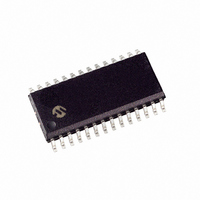PIC16LF872-I/SO Microchip Technology, PIC16LF872-I/SO Datasheet

PIC16LF872-I/SO
Specifications of PIC16LF872-I/SO
Available stocks
Related parts for PIC16LF872-I/SO
PIC16LF872-I/SO Summary of contents
Page 1
... PIC18C601 • PIC18F8621 • PIC18C801 • PIC18F8680 • PIC18C658 • PIC18F8720 • PIC18C858 © 2006 Microchip Technology Inc. MSSP MODULE 2 1. Module: I C™ (Slave Mode) In its current implementation, the module may fail to correctly recognize certain Repeated Start conditions. For this discussion, a Repeated Start is ...
Page 2
... SPI Slave mode, the clock line must match the proper Idle state. The clock line can be observed by reading the SCK pin. The Idle state is determined by the CKP bit (SSPCON1<4>) .” © 2006 Microchip Technology Inc. ...
Page 3
... MHz 1 MHz 2 Note 1: The I C™ interface does not conform to the 400 kHz I 100 kHz) in all details, but may be used with care where higher rates are required by the application. © 2006 Microchip Technology Inc. MSSP MODULE BRG Value CY 20 MHz 18h ...
Page 4
... C communication may suspend. Do not change any of the TRISx bits (TRIS bits of the port 2 containing the I C pins) using the instruction BSF 2 or BCF during I C communication absolutely necessary to change the TRISx bits during communication, the following method can be used: © 2006 Microchip Technology Inc. ...
Page 5
... Slave Mode) and 2 (MSSP – SPI, Slave Mode), 2 removed silicon issue – Slave Mode) and added data sheet clarifications 3 and 4 (MSSP – I Revision E Document (7/2006): Removed silicon issue 2 (MSSP – SPI, Slave Mode). © 2006 Microchip Technology Inc. MSSP MODULE Mode). DS80131E-page 5 ...
Page 6
... MSSP MODULE NOTES: DS80131E-page 6 © 2006 Microchip Technology Inc. ...
Page 7
... Select Mode, Smart Serial, SmartTel, Total Endurance, UNI/O, WiperLock and ZENA are trademarks of Microchip Technology Incorporated in the U.S.A. and other countries. SQTP is a service mark of Microchip Technology Incorporated in the U.S.A. All other trademarks mentioned herein are property of their respective companies. ...
Page 8
... Fax: 886-3-572-6459 Taiwan - Kaohsiung Tel: 886-7-536-4818 Fax: 886-7-536-4803 Taiwan - Taipei Tel: 886-2-2500-6610 Fax: 886-2-2508-0102 Thailand - Bangkok Tel: 66-2-694-1351 Fax: 66-2-694-1350 © 2006 Microchip Technology Inc. EUROPE Austria - Wels Tel: 43-7242-2244-3910 Fax: 43-7242-2244-393 Denmark - Copenhagen Tel: 45-4450-2828 Fax: 45-4485-2829 France - Paris Tel: 33-1-69-53-63-20 ...














